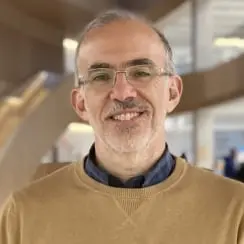 | 1.5 LU |
 | 1.5 LU |
Call to Action:
Abstract: The sudden irruption and irreversible advent of generative AI has radically transformed the present and future of education, with an almost unfathomable impact on teaching and learning. It is essential that education move beyond what was known as the hybrid model, an unfortunate moniker denoting the elusive and somewhat uninspiring blend between e-learning and face-to-face learning. The scope and magnitude of the changes entailed require a completely new learning paradigm, a veritable new species, one which can harness the potential of AI as a cognitive catalyst to develop higher order thinking skills, resulting in the need to create new and unprecedented forms of learning. As it relates to learning environments, how is this new species to impact the learning experiences within the Space, Time, Content Continuum? Is the learning environment to continue to be primarily ‘idle’ in the human-technology-learningspace relationship? Or is this new species a New Horizon for learning environments? Utilizing AI to enhance and extend developmentally appropriate cognitive skills in the school context, necessitates a profound rethinking of learning spaces and typologies, designing for new, enhanced, more engaging and interactive peer to peer collaboration as well as with AI enabled devices and experiences. The session explores, in detail, how AI is revolutionizing learning at its core, avoiding overreliance on GenAI tools that can result in the stifling of cognitive skills, and engages participants in an interactive, AI-powered shared design exercise to identify how learning spaces can trigger off this long overdue transformation of school systems. The interactivity will feature a short, 3 open ended questions survey for participants to fill in on their phones, from it, through AI, we will narrow down their responses to key concepts and experiential learning features, depicting the collective vision of the audience.
Learning Objectives:
Educational Visioning
Facilitating the translation of educational goals / vision into school design requirements.

Tomas is the Design Principal for the Charlotte Community Practice Group, and a Partner at Little, an industry leading architecture and design firm with more than 460 professionals in six locations across the USA. He leads a team of architects and designers dedicated to educational, cultural and civic projects including academic institutions, cultural facilities, performing arts centers, and libraries. Tomas is a member of the AIA, NCARB, A4LE, and is a LEED Accredited professional. Originally from Spain, Tomas received a Bachelor’s degree in Architecture from the University of Houston and a Master Degree in Architectural Design from the University of Texas at Austin. Tomas is focused on projects that fuse typological redefinitions and environmentally conscious design with leading-edge technology and innovation. He is highly passionate about the future of education and has written about the Immersive Learningscape, an approach to the design of educational facilities that respond to 21st century skills, innovation and transdisciplinary collaboration. He is also researching the relationship and connectivity between learning and workplace in the future, and the role of Neuroscience and Wellness in the design of the Learning Ecosystem. He has presented at various National and International conferences, including the AIA National Convention, NEOCON World’s Trade Fair, A4LE International Conference, Innovate Conference in Brazil, and ASB Unplugged in India.

Gabriel is the co-founder and Director of The Learnerspace, a company whose mission is to help build the future of learning. He is also co-founder and Headmaster of The Global School, the first school of its type in Latin America, attempting to make educational change a reality. Formerly Headmaster of St. Andrew’s Scots School in Buenos Aires, Argentina, the oldest bilingual school in the world, he is a passionate educational futurist who is intent on sharing his belief that it is the best time in history to be an educator. Gabriel is the author of eight books:
He has contributed as a co-author to numerous other books and anthologies. A former board member of ASCD and chair of ESSARP, he has spoken and led professional development workshops all over the world, working with educators to help create the future of education. He is recognized as a leading international expert on artificial intelligence in education, delivering frequent workshops and keynotes both online as well as face-to-face. He has worked with schools and education organizations in the US, India, Finland, Singapore, Australia, Brazil, Colombia, Ecuador, Uruguay, Kenya, Denmark, China, Peru, Ecuador, England, Mexico, Argentina and Chile.